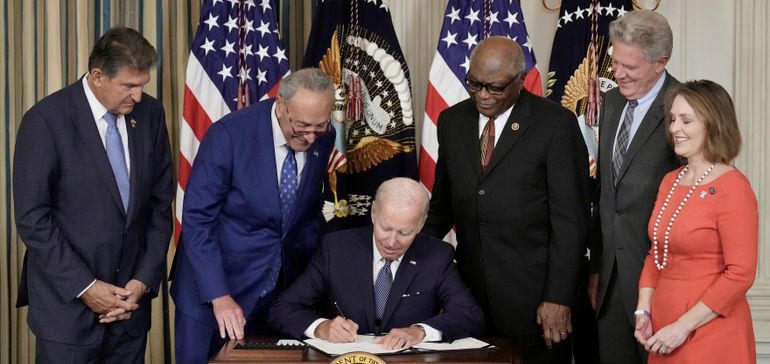[ad_1]
On Tuesday, President Joe Biden signed a $740 billion package into law enacting some of the biggest changes to U.S. healthcare since the passage of the Affordable Care Act over a decade ago.
The Inflation Reduction Act allows Medicare to negotiate drug prices starting in 2026, limits out-of-pocket expenses in Medicare Part D, caps insulin co-pays for Medicare beneficiaries at $35 a month and extends enhanced subsidies for ACA health insurance plans for low-income beneficiaries another three years.
Patient advocacy groups cheered the new law, with Families USA Executive Director Frederick Isasi calling it a David and Goliath moment for the government taking on Big Pharma that, amid persistently high inflation,”could not have come at a better time” for patients.
Payer and hospital groups were also pleased about the continuation of enhanced ACA subsidies, which increase the financial aid to people who were already eligible and also expand subsidies to middle-income individuals who may have previously been priced out of coverage.
The subsidies, which will result in some 13 million people saving $800 a year on their health insurance, should result in less churn on payer rolls in ACA marketplaces and more stable revenues over the next few years for insurers. Meanwhile, hospitals are likely to benefit from more patients remaining on ACA plans, which tend to reimburse at a higher level than other publicly sponsored coverage like Medicaid.
“Bottom line is we’re delighted to see this bill become law,” said Margaret Murray, CEO of the Association for Community Affiliated Plans, which represents more than 70 publicly sponsored plans, in a statement.
Hospital groups however cited workforce shortages, surging labor costs and supply chain issues to ask the government for additional financial aid, signaling the industry’s lobbying fight isn’t done for this year.
“While the Inflation Reduction Act does much to ensure access to care, it falls short of providing the support essential hospitals need as front-line providers during public health crises,” said Bruce Seigel, CEO of America’s Essential Hospitals. “We urge Congress to provide more funding to overcome these challenges.”
Major for-profit hospital operators reported falling net income in the second quarter as admissions slumped year over year and the cost of caring for patients rose.
Among macro headwinds, 2% Medicare sequester cuts that had been paused due to the COVID-19 pandemic took effect last month, and another 4% is scheduled to kick in at year’s end if Congress doesn’t move to delay it. Providers have also called for the government to increase reimbursement rates in its proposed payment rules for 2023 that they say are too low to function in today’s tricky operational environment.
The IRA appeared dead in the Senate until late last month, when Democrats announced a surprise deal with Sen. Joe Manchin, D-W.Va., to get the bill across the finish line.
It passed the Senate in a 51-50 vote on party lines on Aug. 7, with Vice President Kamala Harris casting the tie-breaking vote, and passed the House in a 220-207 vote on Aug. 12.
[ad_2]
Source link


